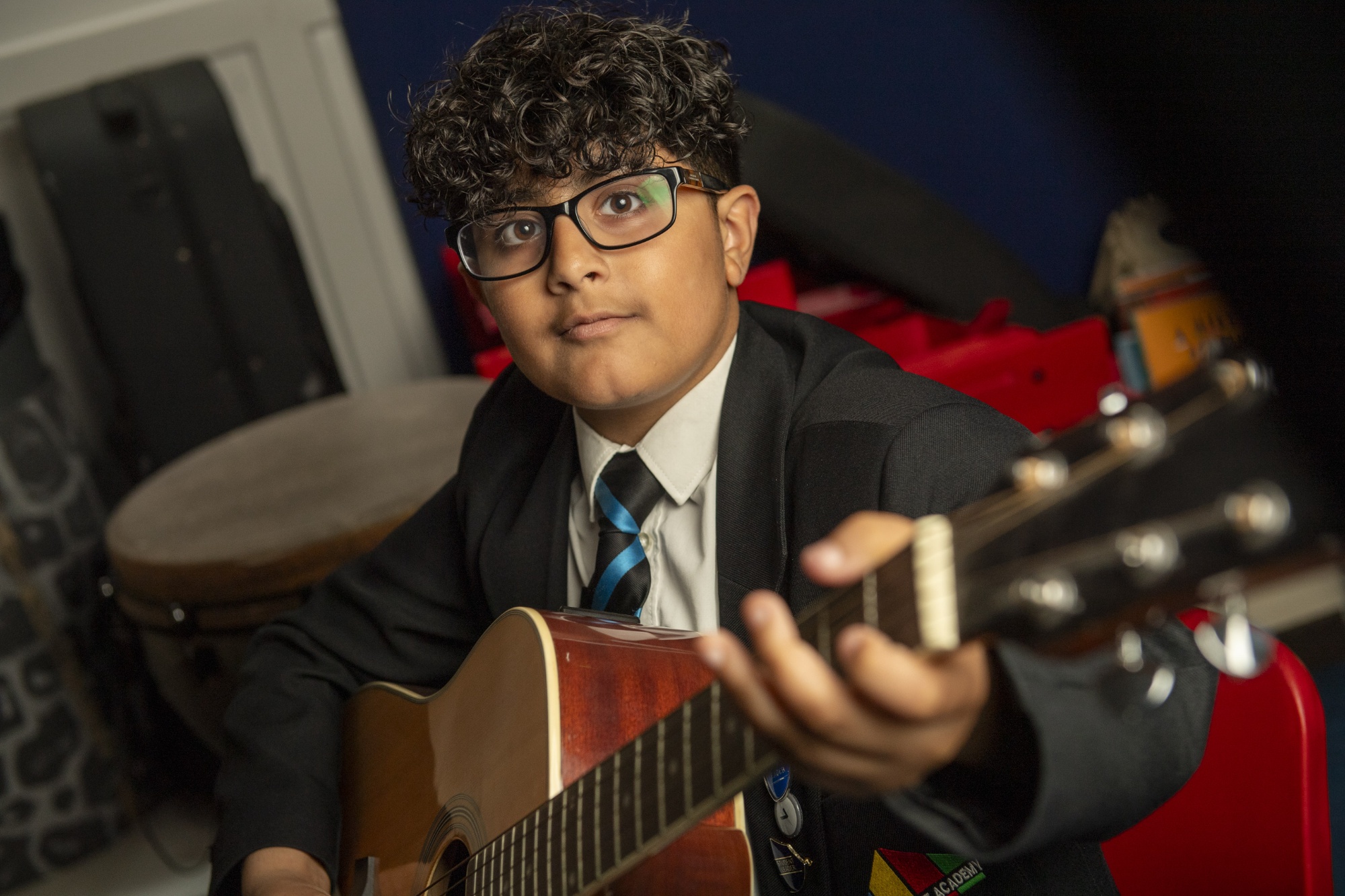Music

Year 7
In Year 7 students will focus on building a universal foundation of musical understanding through performing, composing, listening, and appreciation. Students will engage with music practically and theoretically, developing a range of musical skills, knowledge, and techniques. This will engage and inspire students to develop a love of music from a range of culture and traditions, as well as their own musical skills.
Over the course of Year 7, students will be taught the following knowledge and skills to prepare for their next learning stage:
Improvisation and the orchestra
This topic introduces students to the musical elements, connections between instrument size and shape on the sounds it produces, using stimuli as a starting point, and techniques of developing music. Students will explore the orchestra through improvisation. They will look at the orchestral family groups, the different sounds the instruments make and how this informs the layout of an orchestra. This topic enables students to develop performance skills throughout the term as they perform in several group sizes for peers and the whole class as an audience. Students will also gain knowledge in analysing the use of skills through completing a skills audit at the start and end of topic, they will be able to use this information to evaluate the effectiveness of their performed piece and identify how to improve.
Assessment: Performance/ Teacher and Self-reflection. Links to other subjects: Dance, Drama
Anthems
Students will explore anthems from around the world and understand why we have National Anthems. They will use the skills learnt in the previous term to compose their own anthem which will be performed in front of an audience. Focus for this topic is on composition and performing as well as developing an understanding of how musical elements work. Students will be given access to a range of anthems from national anthems, sporting anthems and local community anthems. Students will use the improvisation skills learnt last term as they are composing their own anthem. They will use musical elements learnt through the orchestra to apply when analysing and composing and gain skills in communication and performance confidence. This unit with provide the building bricks for future learning, such as, musical passport and music for performance (puppetry) as it will encourage appropriate use of musical elements, and keyboard skills. Students will be able to describe music using keywords, explain why they think they are effective and use ideas from existing songs to inspire when writing their own anthem.
Assessment: Composition and Performing/Teacher and Peer Observation. Links to other subjects: Drama, Dance, Geography, History
World Musical Passport
In this topic students will look at music from around the world and focus on how rhythm, structure and texture affect the sound produced from the music of that country. Students have gained a basic knowledge of how to compose music using improvisation and the musical elements. Through composition of anthems, students have begun to understand the application of appropriate musical elements to create mood and meaning. World Music Passport allows students to develop and broaden their knowledge and skill of applying the musical elements as well as build on this skill set through the introduction of cyclic and poly rhythms, ostinatos and drones, question, and answer. Throughout the Spring term, students will study Chinese, African, Latin-American and Indian music. They will learn how music is arranged, what makes the unique quality of sound and experience playing music from that country/continent. This topic allows students to perform in a variety of groups sizes, from whole class ensemble to solo/duo. They will use learnt knowledge to develop and consolidate their skill base by composing a piece of music which is influenced by one of the studied countries.
Assessment: Performance/Recording/Reflection. Links to other subjects: Drama, Dance, English, Geography
Music in Puppetry
This topic is an opportunity for students to consolidate their learning as well as link music with the performing arts. Students will compose music to accompany a puppet show they are creating in performing arts lessons. They will develop their understanding of how stylistic qualities impact performance in a complimentary manner as well as create atmosphere and set the mood. Students will be able to develop their understanding and application of note value, time signatures and structure whilst composing and performing. They will use learnt skills such as improvisation, developing motifs to create different moods or meanings as well as developing movement/placement memory and performance skills. Compositions will be played over the puppet show they are creating in performing arts and will have the opportunity to be performed at the CPA Festival.
Assessment: Recording/Performance and Evaluation Links to other subjects: English, Drama, Dance, History
Year 8
Students continue to develop their listening skills, practical skills and musical knowledge. Utilising the skills and techniques explored in Year 7 students continue to develop Music technique and understanding. Within the Year 8 curriculum, students will listen and review styles of music, describing the key features of Music. They will explore music practically learning the foundation of reading, playing and composing their own music. They will use vocal skills to sing, rap and sell their music products.
They will work independently and part of a team to create both solo and ensemble work, gaining skills and techniques to prepare them for the Year 9 curriculum.
Year 9
Musical Elements and Composition
In this topic, students are reassociated with the musical elements, to develop their knowledge and skills. They will look at how the musical elements inform the creative outcome in preparation for composing a piece of music from given stimuli. Students will be given a range of images as a starting point and taken through the process of composing from the chosen image. They will be introduced to music notation using grid notation to record their composition and then use this in performance. This topic allows opportunities for students to engage in active music making as a whole class, in small groups, duo and individually. This will help develop students’ communication skills as well as develop working relationships with resilience and diplomacy.
Assessment: Performance/Evaluation Links to other subjects: Drama, Dance, English, MFL
Rap Music
Students will explore the art of rap music. They will learn about the history of rap, how it has evolved and how it is produced. Students will write their own rap using specific processes as professional do, produce interesting and appropriate beats for their rap and perform to the class. Students will also take part in rap battles within the class where they will have the opportunity to add drama and dance skills. Students will also learn about marketing their rap for a wider audience. They will complete a skills audit at the start of the topic and one at the end of the topic to analyse and celebrate progress made.
Assessment: Performance/ Evaluation Links to other subjects: Drama, Dance, English
Computer & Video Game Music
This topic begins by looking at Character Themes in computer and video game music before pupils move on to explore ways in which Character Themes can be developed and changed for different atmospheres and scenarios within computer and video games. The characteristic musical features of much computer and video game music: jumping bass lines, staccato articulation, chromatic movement, and syncopation are included as musical knowledge through composing and performing tasks. Sound effects are then explored and pupils either perform or create a range of sound effects to match common actions and cues within games. Finally, the topic ends with students undertaking a performance project based on creating a musical score/soundtrack for a computer or video game creating their own ground theme and sound effects which will be performed and assessed.
Assessment: Recording/ Reflection Links to other subjects: Drama, Dance
Film Music
Throughout this topic students will gain an understanding of the importance and purpose of music in film. Students begin with an introduction to creating the correct mood/atmosphere for the film by using pre-existing theme songs realising the decisions and challenges a composer of film music faces. Students will learn about how leitmotifs are an important aspect of film music; they will compose their own theme song including a leitmotif to represent certain characters and situations. Students will explore to impact of diegetic and non-diegetic sounds and how these can impact the effectiveness of a theme song as well as mood changes within a piece of music.
Performance/ Reflection & target setting Links to other subjects: Drama, Dance, English
Music and Technology
This topic introduces students to working within the music industry using technology. They are given a brief in which they will fulfil as a solo music maker for a production company. Students will plan and compose a piece of descriptive music for a pre-existing moving image. To do this, students will compose and record their composition using DAW software, (Digital Audio Workstation). Students will recall learnt knowledge and skills from their key stage 3 music journey. The final composition will be performed with the moving image where students will analyse their new knowledge and skills and progress of prior knowledge and skills. Students will also undergo a skills audit at the start and end of the topic to analyse individual progress made.
Assessment: Performance recording, skills audit Links to other subjects: Drama, Dance, ICT
Pendle Project
The final topic gives the students an opportunity to consolidate their key stage 3 learning journey. They will perform music for a site-specific performance based around the Pendle Witches which they are creating in Performing Arts. Students are required to make informed choses as individuals and within groups of varying sizes. They will be given the choice to compose music using live instruments or technology. They will select and apply musical elements as well as techniques to develop and refine a meaningful descriptive piece of music which compliments their performing arts performance piece.
Assessment: Performance/ Reflection & Target setting Links to other subjects: Drama, English, History, Dance?
If you would like any more information about our Music curriculum, please contact Mrs S Goldie, Head of Creative Arts, by emailing sgoldie@colneprimet.co.uk, filling in the form on our contact us page or phoning the main office to arrange a call back.
